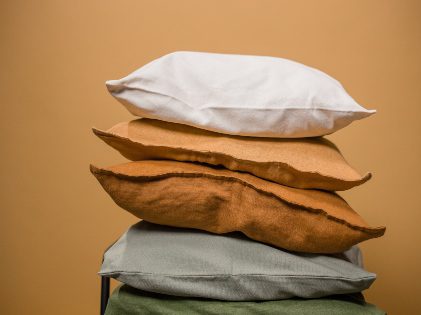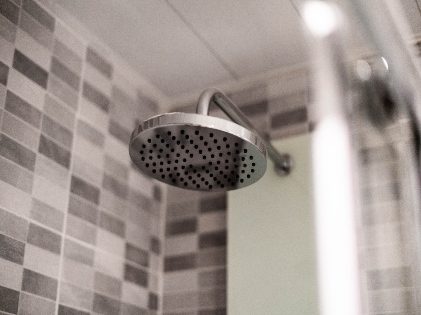Acne is the most common skin problem among people; some people are more prone to it than others. Acne depends on a number of factors like hormonal changes and genetics, which are beyond human control. But some habits and changes in lifestyle can reduce its severity, if not completely eradicate it. In this article, we will tell you some ways through which acne-prone people can get some ease:
Avoid Sugar, Dairy, and Refined Carbs
Sugar, refined carbs, and dairy products increase the insulin level in the body, which provokes oil-producing glands to produce excessive oil on the skin which results in acne. It is recommended to eat a well-balanced, healthy diet and eat more fresh fruits and green vegetables which reduces inflammation in the body and thus reduces Acne.
Wash Pillowcase Frequently
 The pillowcase catches bacteria when slept on, and will reintroduce them to the skin. It is recommended to wash off pillow covers at least twice a week and change them regularly if the sleeper frequently uses hair products like mousse, oil, hairspray, or gel; which leave residue behind, and when contacted with the skin, which can result in acne.
The pillowcase catches bacteria when slept on, and will reintroduce them to the skin. It is recommended to wash off pillow covers at least twice a week and change them regularly if the sleeper frequently uses hair products like mousse, oil, hairspray, or gel; which leave residue behind, and when contacted with the skin, which can result in acne.
Avoid Over Cleansing
Cleaning your skin twice a day is enough, people assume that over-cleaning will help acne, but it’s not true. Over-washing removes the good oil from the skin, encouraging it to produce more oil to compensate. Physical scrubbing can further cause irritation and skin breakouts, which can worsen acne.
To relieve acne, it is recommended, that the cleanser should have fruit enzymes, glycolic acid, and salicylic acid to remove dead skin cells without scraping and scratching the skin.
Wash Off Makeup Before Going to Bed
 Sleeping without clearing makeup, clogs pores with makeup, dirt, and sweat that is accumulated on the face throughout the day. When the pores get clogged it leads to the formation of Microcomedone, which can develop acne bacteria in the skin's pores and cause a breakout.
Sleeping without clearing makeup, clogs pores with makeup, dirt, and sweat that is accumulated on the face throughout the day. When the pores get clogged it leads to the formation of Microcomedone, which can develop acne bacteria in the skin's pores and cause a breakout.
Quit Smoking
Studies have proven that acne is directly linked to smoking; it further damages the collagen and elasticity of the skin, which makes it difficult for the skin to heal from acne and its scars.
Stop Excessive Caffeine Intake
Overconsumption of caffeine dehydrates the skin and provokes acne breakouts. Also, it makes the skin look dry, dull, and aged. Also, avoid drinking alcohol. While there is no absolute link between alcohol and acne, alcohol consumption can lead to some bad habits like sleeping without removing makeup and neglecting self-care, which can induce acne on the skin. Also, alcohol dehydrates the skin, which can further cause the skin to overproduce oil that can cause acne.
Take Shower Regularly
 Body acne is more irritating than face acne. When heat and sweat get stored under the clothes; it leads to the development and multiplication of bacteria on the skin which can cause acne called Acne Mechanica. It is recommended to wear breathable clothes and take showers regularly.
Body acne is more irritating than face acne. When heat and sweat get stored under the clothes; it leads to the development and multiplication of bacteria on the skin which can cause acne called Acne Mechanica. It is recommended to wear breathable clothes and take showers regularly.
Avoid Getting Stressed Out
Stress releases cortisol hormones which provide signals to the skin to produce more oil. Excess oil clogs the pores and, when combined with bacteria, leads to a giant inflamed pimple.
Change Your Medicines
Certain medicines cause acne, and it's imperative that you replace them with alternative medicines. If your acne is popping out after taking certain medicines, talk to the gynecologist and get them replaced. Any medicine, which is meant to alter hormones can produce acne by stimulating the sebaceous gland; hence such medicines should be immediately switched to other medicines.
Get Ample Sleep
Sleeping 7 to 8 hours regularly is necessary as lack of sleep provokes stress, and can result in stress-induced acne.
Stop Touching the face
As hands come in contact with germs, they can be transferred to the face on touching, which can cause bacterial development on the skin, either resulting in or worsening pimples.
Acne is often considered a problem that has no solution because it is generally related to hormonal changes or genetics. However, it is proved in many pieces of research that reduction in acne is easily possible by quitting some bad habits and following an acne control regime with discipline. Also, the patient should consult a good dermatologist and gynecologist, to conduct proper treatment of the disease, rather than ignoring it or applying self-medication.

